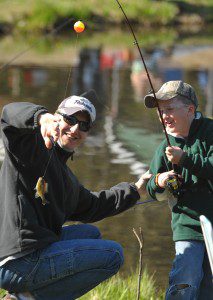
A father and son enjoy a day of fishing at the Westfield Sportsmen’s Club in 2011. Club officials are seeking approval from the Conservation Commission to use a chemical treatment to eradicate a weed infestation in the six-acre pond at the Furrowtown Road facility. (File photo by chief photographer Frederick Gore)
WESTFIELD – The Westfield Sportsmen’s Club is seeking approval from the Conservation Commission to use a chemical treatment to eradicate a weed infestation in the six-acre pond at the Furrowtown Road facility.
Ryan Joyce, a Wetland Scientist with New England Environmental, Inc. of Amherst, presented details of the current situation and the plans to address the weed problem.
Joyce said the treatment, with the copper-based herbicide Diquat, would be applied to sections of the pond in stages, to protect the fish which will move to untreated water.
“We’re planning to treat the pond to get rid of one specific plant,” Joyce said. “We did a survey of the pond and found this species is everywhere in the entire six acres.”
The pond, which is only three to four feet deep, is created by a weir, or dam, holding back the water flowing into the shallow basin.
Joyce said that the firm assessed other means of weed control, such as physical harvesting, or drawing down the water in the shallow pond, but decided that the chemical treatment was the most efficient means of eradication.
The Conservation Commission members raised a number of issues, including the nutrient load “feeding” the aquatic plants.
Commissioner Dr. James Phillips asked if the water feeding the pond was carrying nutrients into the pond.
“What is different?” Phillips asked, “What is the point source of the nutrients flowing into the pond? Has something occurred upstream, a new development?”
Joyce said the pond is fed from wetlands north and west of the Sportsmen’s Club property and that there has been no change in the resource area.
Phillips continued to question Joyce, asking if the present condition is the result of a recent bloom.
Joyce replied that the weed infestation has been a problem for years, but the continued weed growth has become so bad in recent years that fishing is impossible because hooks and lines become entangled in the surface mat of weeds.
One of the major events at the club is the annual youth fishing derby, when the club opens fishing in the pond to children citywide as a means of introducing fishing to those youths.
Phillips said the problem species at the club is “not usually as invasive” as other non-native aquatic plants and asked who identified the species, then suggested that other alternative control methods should be considered.
“Who identified this plant? There are several other species with very similar appearances,” Phillips asked.
Joyce said that that the firm took samples of the weed which was identified by biologists.
The commission members voted to continue the hearing to their March 12 session, requesting Joyce to further study the nutrient load and alternative control methods. The commissioners also decided to visit and inspect the site after the ice cover has melted.

